
Pelvic Floor Muscles Physiotherapy: Strengthening Your Core from Within
- Dr. Prachi Saini (MPT)
Connect with our expert physiotherapist for personalized physiotherapy advice.
The pelvic floor is a crucial yet often overlooked group of muscles that support essential bodily functions. From bladder control to sexual health, these muscles play a vital role in our daily well-being. Weak pelvic floor muscles can lead to conditions such as urinary incontinence, pelvic organ prolapse, or sexual dysfunction. Physiotherapy for pelvic floor muscles is an effective way to treat and prevent these issues, improving your overall quality of life.
What Are Pelvic Floor Muscles?
The pelvic floor muscles form a supportive hammock at the base of the pelvis, holding organs such as the bladder, uterus (in women), and rectum in place. These muscles also play a significant role in controlling bowel and bladder movements. In both men and women, they support the function of reproductive and digestive organs.
Common Conditions Linked to Pelvic Floor Dysfunction
- Urinary Incontinence:
Leakage of urine due to poor muscle control.
- Pelvic Organ Prolapse:
When pelvic organs drop from their normal position due to weakened muscles.
- Fecal Incontinence:
Inability to control bowel movements.
- Sexual Dysfunction:
Painful intercourse, erectile dysfunction, or inability to achieve sexual satisfaction due to muscle tension or weakness.
- Chronic Pelvic Pain:
Persistent pain in the pelvic region, which could be due to muscle tightness or dysfunction.
Causes of Pelvic Floor Muscle Issues
Several factors can weaken the pelvic floor muscles, including:
- Childbirth:
Vaginal delivery can stretch or tear the pelvic floor muscles.
- Aging:
Muscle tone naturally decreases with age.
- Surgery:
Procedures such as prostate or hysterectomy surgeries can damage these muscles.
- Obesity:
Excess weight adds pressure to the pelvic floor.
- Chronic Straining:
Conditions like chronic constipation or heavy lifting can strain the pelvic floor.
- Menopause:
Hormonal changes can weaken these muscles in women.
- High-Impact Sports:
Certain sports, like running or gymnastics, can contribute to muscle weakening.
How Physiotherapy Helps the Pelvic Floor
Pelvic floor physiotherapy is a specialized treatment focused on restoring strength, flexibility, and control to the pelvic muscles. It helps both men and women manage pelvic floor dysfunction through various non-invasive techniques.
- Pelvic Floor Exercises (Kegels)
One of the most effective exercises for strengthening the pelvic floor is the Kegel exercise. This involves contracting and relaxing the pelvic floor muscles repeatedly. Physiotherapists guide patients in performing Kegels correctly, ensuring proper technique and optimal results.
- Biofeedback
Biofeedback devices help monitor pelvic floor muscle activity, giving real-time feedback to help patients understand how to properly engage the muscles. It’s especially useful for individuals who struggle with identifying and isolating these muscles.
- Manual Therapy
Physiotherapists may use manual techniques to release tension or trigger points in the pelvic floor muscles. This method helps to alleviate pain and discomfort associated with muscle tightness or spasms.
- Electrical Stimulation
For individuals with severely weakened pelvic floor muscles, electrical stimulation can be used to activate these muscles. This technique stimulates muscle contraction and helps in retraining the pelvic floor to function properly.
- Posture and Breathing Techniques
A physiotherapist may also incorporate posture correction and breathing exercises into the treatment. Poor posture and incorrect breathing patterns can place additional strain on the pelvic floor muscles, so optimizing these can enhance recovery.
Benefits of Pelvic Floor Physiotherapy
- Improved Bladder and Bowel Control:
Reduce episodes of urinary or fecal incontinence.
- Prevention of Prolapse:
Strengthening the muscles can prevent or minimize pelvic organ prolapse.
- Enhanced Sexual Health:
Strengthening or relaxing these muscles can improve sexual satisfaction and reduce pain
- Relief from Chronic Pain:
Alleviate chronic pelvic pain caused by muscle dysfunction.
- Post-Surgical or Postpartum Recovery:
Aid in the recovery of pelvic strength after surgeries or childbirth.
When to Seek Pelvic Floor Physiotherapy
If you experience any of the following symptoms, it may be time to consult a physiotherapist:
Difficulty controlling bladder or bowel movements.
A feeling of heaviness or pressure in the pelvic area.
Pain during intercourse.
Chronic lower back or pelvic pain.
Recurrent urinary tract infections (UTIs).
Postpartum discomfort or pain.
Conclusion
Pelvic floor dysfunction can affect anyone at any stage of life. Whether you’re recovering from childbirth, managing aging-related issues, or dealing with pelvic pain, physiotherapy offers an effective, non-invasive solution to restore muscle function and improve your quality of life. Don’t wait until symptoms become severe—seek professional help early to maintain pelvic health.
Connect with our expert physiotherapist for personalized physiotherapy advice.



